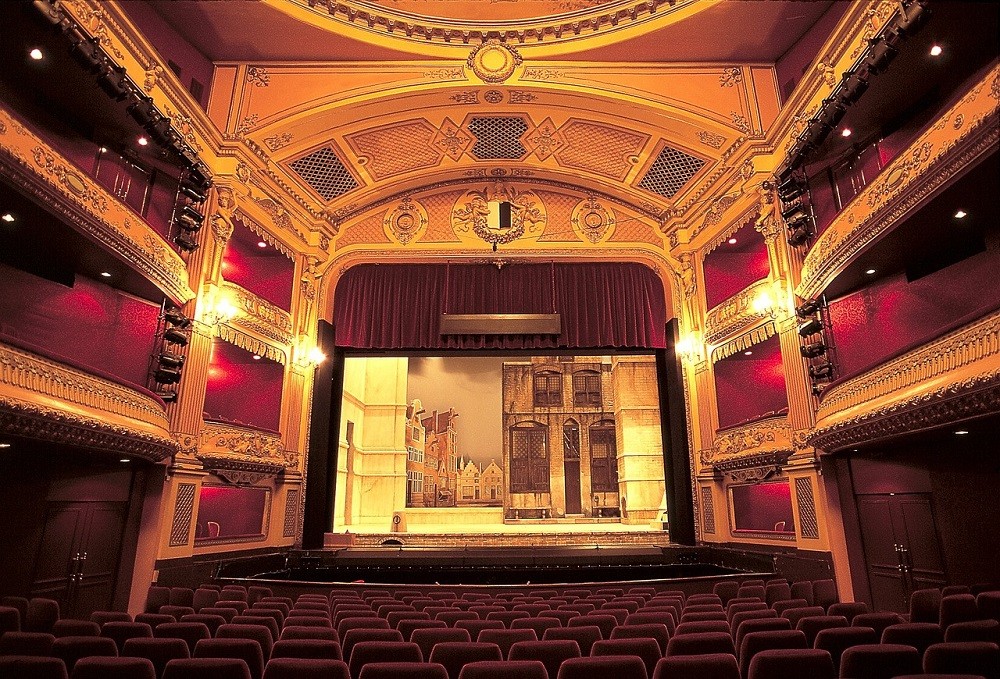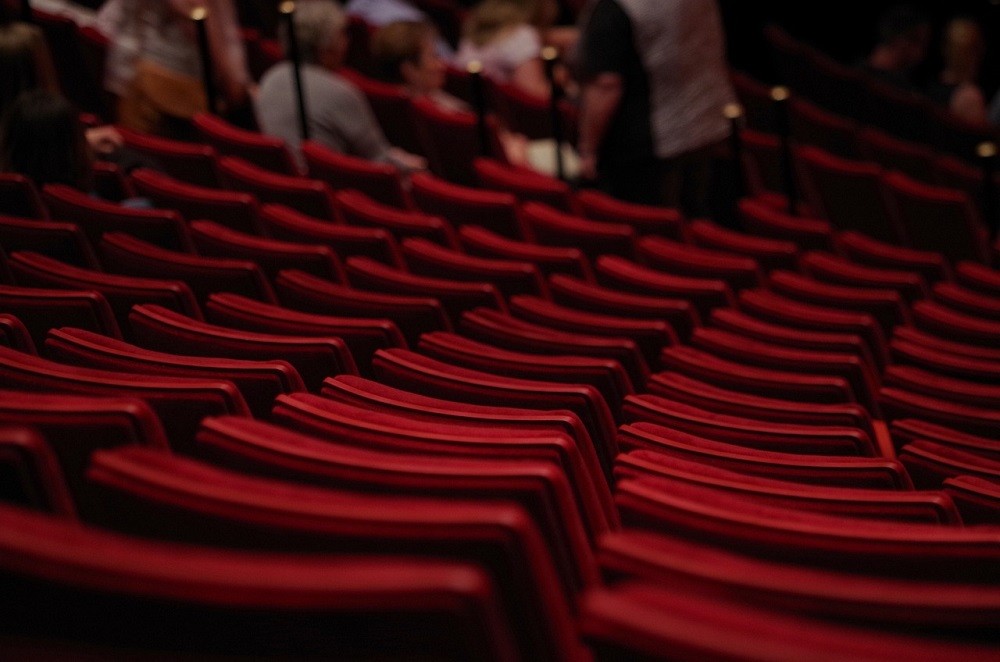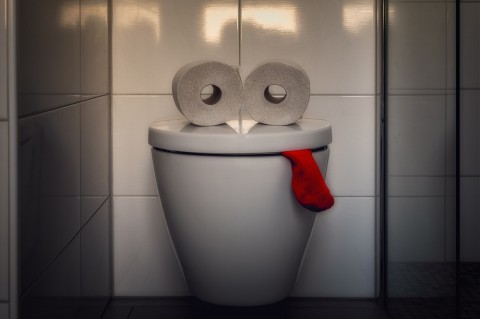The Esteemed Gentleman Articles
Mastering Theatre Etiquette: Your Ultimate Guide For A Night Out
Attending a live theatrical performance is a wonderful experience. Whether you are on a date, with friends, or want to catch the latest performance on your own, there are some important theatre rules and etiquettes you need to be aware of.
In this article, we will review some of the most common theatre etiquettes and how to follow them properly, not just for your enjoyment, but for those around you as well. Every person in the auditorium has a role to play, even if you're in the crowd. Here is your ultimate guide to theatre etiquette:
Dress Appropriately When Going To The Theatre
Even if there isn't a strict dress code, it is still good etiquette to put some effort into your attire when going out. A simple smart-casual outfit consisting of a button-up shirt, trousers, and a sport jacket is a safe choice. If you are attending the theatre with your date, be sure to read our article How Does A Gentleman Dress On A First Date? for some helpful tips and ideas (even if it isn't your first date).
If the theatre has a dress code, be sure to dress appropriately or you may not be allowed access into the venue. Many theatres will include dress code requirements via email or on their website. Some theatres may promote local suit rental companies so you don't need to invest in a full suit to attend a performance.
Arrive To The Theatre On Time
Many theatres open their doors 30 to 60 minutes before the performance. Arriving early gives you time to pick up your tickets (if you don't already have them), read through the playbill, enjoy a drink and snacks at the bar, and find your seat. This is also the proper time to converse with friends and check your phone. You want to be in your seat at least 5 to 10 minutes before to show starts.
Arriving late may result in you being assigned a new seat at the back of the theatre, waiting until an usher can escort you, or waiting until intermission before you can sit in your seat. Some theatres may close the doors a minute before the first line is spoken or as soon as the orchestra plays their first note to prevent anyone from trying to sneak in and ruining the ambience.
A Quick Note On Theatre Coat Checks
Some theatres have coat checks while others don't. Coat checks allow you to leave your coat, hat, and any large bags with an attendant who will securely store them for you until the show is over. Theatres will often charge $2-5 per item (or person) in exchange for a ticket you need to return to the attendant to get your items back.
While it isn't customary, it is good etiquette to tip the coat check attendant a couple of dollars when you retrieve your items.
For more useful information on coat check etiquette, read our article Mastering Coat Check Etiquette: Everything You Need To Know.
Know Which Way To Face When Finding Your Seat In A Theatre
The question of which way to face when finding your seat is almost as old as theatre itself. Proper etiquette dictates that you should always face the stage and keep as close to the seats in front of you as possible.
This prevents your back end from ending up in someone's face. Also, while it may seem rude to have your backside near someone's face, most people agree it's less awkward than a face-full of what's on the other side.
Having your back to the stage, especially if someone is speaking or acting, is considered bad manners. To them, you aren't paying attention to the show. Some performers even consider this bad luck.
Remove Your Hat As Soon As You Sit Down
If you have not yet removed your hat, now would be the time to do so. Removing your hat allows those sitting behind you to have an unobstructed view of the entire stage.
Depending on the type of hat you wore, you can keep it on your lap or place it under your seat. If you are curious about general hat etiquette, our article Hat Etiquette: When And Where To Wear Your Hat will answer any questions you may have.
Turn Off Your Devices Before The Show Starts
Mobile phones and other electronic devices should be turned off before the house lights are dimmed. A loud ringer or bright screen could be distracting to other patrons and performers. If you need to check your phone periodically, do so discreetly during breaks between scenes or during intermission.
If you absolutely need to make or take an emergency phone call, excuse yourself from your seat and take the call into the lobby.
Many seasoned theatregoers take phone etiquette seriously. So seriously, in fact, that they may call you out if they see you on your phone. If you want to brush up on your mobile phone etiquette, please read our articles:
Refrain From Eating During The Show
Eating at a theatre should be done before the show starts, during intermission, or after the show is over. The sound of rustling wrappers, crunching, and munching can be distracting. Theatres generally do not allow outside food or drink for these reasons.
Lozenges are commonly offered to patrons as a way to reduce coughing during the performance. They keep your mouth and throat moist, reducing any irritation you may experience during the show. These should be unwrapped before the performance starts, even if you have multiple lozenges.
Avoid Talking (Or Singing) During The Performance
To be fully immersed in the production, it's best to be quiet. Even the slightest murmur can be enough to break the captivating hold a theatre play can have on someone. Loud patrons will face consequences in the form of being shushed, and if they continue, they may be escorted out of their seat by an usher. If you absolutely must speak to the person beside you, whisper it quickly.
Singing, especially during musicals, is considered bad theatre etiquette. Not only is it disruptive to those around you, but the performers on stage will find it distracting. Singers and dancers use certain words and phrases as cues to enter or exit the stage or perform specific choreographed moves during their dance routine.
The only exception to this rule is if someone from the show has allowed audience participation either by announcing it before or during the performance. An example of this would be clapping along to the beat during a routine or during a call and response section in a musical.
If You Are Encouraged To Participate, Do So
Some theatre performances, like comedy routines and burlesque shows, encourage audience participation. Cheering, laughing, hollering, and clapping are all acceptable ways to participate in these types of performances.
Performers, like comedians, feed off audience participation. Hearty laugher and cheering can encourage them to extend their set, which may include new jokes and routines that most people haven't heard before.
Negative audience participation, like booing, is disrespectful in the theatre community. Even if the performer is terrible, it's best to remain silent rather than to humiliate them with a shower of boos and cynical remarks. Never ever throw anything on stage. This will get you kicked out and possibly banned from the theatre.
Do Not Take Photos Or Videos If The Artist And/Or Venue Has Said So
Live performances are best experienced first-hand, not recorded on a phone. Being captivated by the action and scenes unfolding in front of your very eyes will leave lasting memories whereas focusing on getting the perfect shot for a video you might only watch once, won't.
Theatres often enforce strict "no photography and/or videography" rules as many productions are copyrighted, meaning any unauthorized publications can result in major fines and, in serious cases, jail.
Scripts, songs, costumes, and set designs are often protected as intellectual property as well, meaning the creators can sue if they feel as though their ideas are being plagiarized or they find pictures and videos of their creations online.
Be Mindful Of Those Around You
Standing up during scenes, fidgeting, or leaning over to the person beside you can be disruptive to those behind you. Be mindful of them as they too have paid for a ticket and want to enjoy the show. Most theatre seats are staggered, meaning the seats in every other row will be shifted, creating unobstructed field of views between seats.
If someone behind you tells you to be quiet or says you're blocking their view, stop and reposition. Be sure to apologize to them either during intermission or at the end of the show. Some regular theatregoers may know the ushers or staff and could get you kicked out for rude behaviour.
If the person in front of you is being disrespectful, lean in towards them and quietly tell them to stop. If they refuse, try to get an usher's attention by looking at them and waving them down once they make eye contact with you. Do not get up and walk over to them except during intermission. Ushers are usually scanning the audience so they will see you.
Once the show is over and the performers come out to take a bow, you may stand up to give a standing ovation. If those around you give a standing ovation, you should as well. If you aren't sure when to clap, cheer, or stand, follow the crowd. You don't want to be that guy that cheers or claps by himself.
Do Not Leave Your Trash Behind
It is good etiquette, and common courtesy, to pick up any trash that belongs to you when you leave the theatre. This includes wrappers, receipts, playbills, or anything you didn't dispose of before you sat down. Although theatres have janitorial staff that cleans after every performance, you can lessen their workload by picking up after yourself.
Once The Show Is Over, Leave The Theatre In An Orderly Fashion
Once the house lights turn on, a clear indication that the show is over, wait for those in the seats between you and the closest aisle to depart. If they decide to remain seated, you can move past them towards the aisle.
Once you reach the last seat in the row, be mindful of those moving in the aisle towards the exits. If they stop to let you into the aisle, thank them and then move with the flow.
Do not try to cut in as this can cause a chain reaction of people suddenly stopping, which will cause a traffic jam. Refrain from stopping in the aisle to strike up a conversation with someone or check your phone.
As soon as you are out of the auditorium and into the lobby, move out of the way if you wish to check your phone or chat with friends. Be respectful and hold doors open for those behind you as you leave (walking through first and then holding it open long enough for the person behind you to reach it is perfectly acceptable).If You Want To Meet Performers Or Get Autographs...
Depending on the theatre and event, there may be an opportunity to meet the performers and get autographs. This will be announced once the show has concluded, or there will be a sign to direct those interested on where to go.
If you want to meet the performers and get autographs, go to the designated area as soon as possible. There may be security or ushers directing people on where to line up. Once in the line, have the memorabilia you wish to be signed ready. Most performers will happily sign a couple of items, but please do not bring a stack of headshots for them to sign.
If you are meeting performers, be sure to rehearse what you want to say to them while you're in line. Be direct and concise, especially if there are more people lined up behind you. If you wish to take pictures with them, be sure to ask for their permission first.
Tip: Always bring a marker or Sharpie with you, even if you aren't sure if there will be an autograph session. You never know!
Summary
The most important rule of theatre etiquette is to be respectful of those around you. Mastering that will make every other etiquette rule we discussed much easier. Remind yourself of this simple theatre etiquette guide next time you plan on attending a performance and you'll have a wonderful time.
Interested in more etiquette? Read our other articles:
When you subscribe to the article, we will send you an e-mail when there are new updates on the site so you wouldn't miss them.










Comments